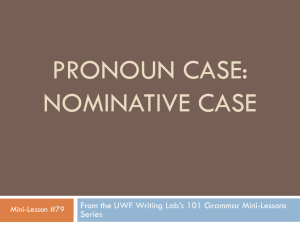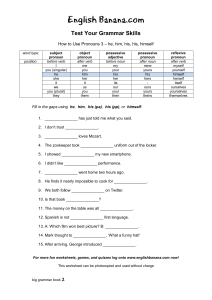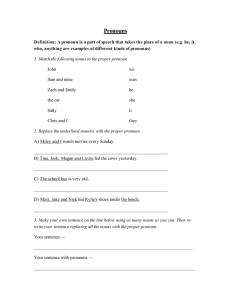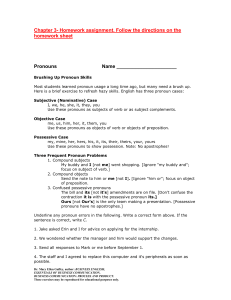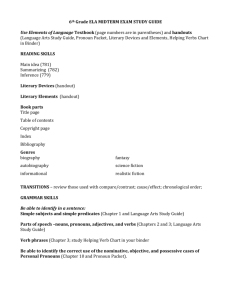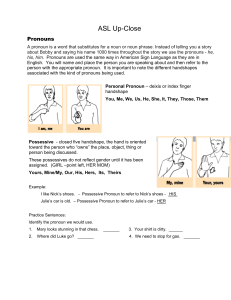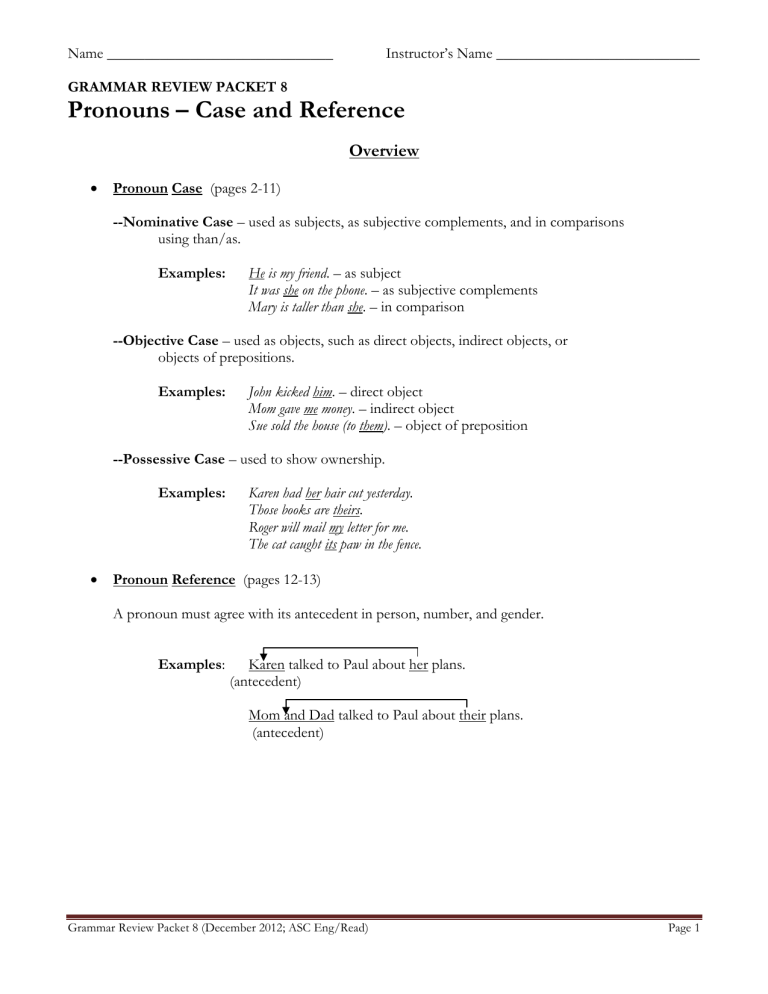
Name ______________________________
Instructor’s Name ___________________________
GRAMMAR REVIEW PACKET 8
Pronouns – Case and Reference
Overview
Pronoun Case (pages 2-11)
--Nominative Case – used as subjects, as subjective complements, and in comparisons
using than/as.
Examples:
He is my friend. – as subject
It was she on the phone. – as subjective complements
Mary is taller than she. – in comparison
--Objective Case – used as objects, such as direct objects, indirect objects, or
objects of prepositions.
Examples:
John kicked him. – direct object
Mom gave me money. – indirect object
Sue sold the house (to them). – object of preposition
--Possessive Case – used to show ownership.
Examples:
Karen had her hair cut yesterday.
Those books are theirs.
Roger will mail my letter for me.
The cat caught its paw in the fence.
Pronoun Reference (pages 12-13)
A pronoun must agree with its antecedent in person, number, and gender.
Examples:
Karen talked to Paul about her plans.
(antecedent)
Mom and Dad talked to Paul about their plans.
(antecedent)
Grammar Review Packet 8 (December 2012; ASC Eng/Read)
Page 1
Pronoun Case
In the following sentences, notice the different forms of pronouns:
She and I work in the same elementary school
Mom assigns extra yard duty [to her and me].
Tim gave his book to my sister.
If you examine these sentences, you will notice that she and I are subjects of the first sentence, that her and
me, in the second sentence, are objects of a preposition, and that his and my show possession in the third
sentence. A pronoun may have one form when it is a subject, a different form when it is an object, and still
another form when it is possessive.
Some pronouns change their form according to the way that they are used in sentences. This difference in
form is called case. Pronouns used as subjects, as subjective complements, or in comparisons using than/as
are in the nominative case. Pronouns used as objects are in the objective case. Pronouns used to show
ownership are in the possessive case.
Listed below are the nominative, objective, and possessive pronouns:
NOMINATIVE
Singular
Plural
OBJECTIVE
Singular
Plural
POSSESSIVE
Singular
Plural
I
you
he
she
it
who
me
you
him
her
it
whom
my, mine
your, yours
his
her, hers
its
whose
we
you
they
who
us
you
them
whom
our, ours
your, yours
their, theirs
whose
Please note that you and it are nominative and objective pronouns. Her is objective and possessive.
NOMINATIVE CASE
I. As subjects: The pronouns I, you, he, she, it, we, they, and who are used as subjects of verbs.
Example: (She, Her) was getting tired.
The correct choice is she because it is the subject of the verb was getting.
She was getting tired.
Is (he, him) going to the store?
(Change a question to a sentence: (He, Him) is going to the store.
The correct choice is he because it is the subject of the verb is going.
He is going to the store.
Exercise 1: Circle the correct pronoun.
1. Where is (she, her)?
2. In September (we, us) are going on a cruise to Mexico.
Grammar Review Packet 8 (December 2012; ASC Eng/Read)
Page 2
3. Did (he, him) win the contest?
4. Should (they, them) register before Monday?
5. The sponsors will decide if (I, me) should get a uniform.
Errors in nominative pronoun case sometimes occur when the subject is compound—when it consists
of two subjects joined by and or or. To illustrate, “Them drove to Tampa” would sound incorrect to most
people. However, “Joanna and them drove to Tampa” does not sound incorrect to some people because of
the compound subject.
You can avoid making this error in a compound subject by taking out and/or and trying each part of the
subject alone with the verb.
Example:
Joanna and (they, them) drove to Tampa.
(Joanna drove to Tampa, and they drove to Tampa.)
Joanna and they drove to Tampa.
Occasionally, you may have to change the tense of the verb when checking each subject separately.
Example:
Joanna and (I, me) are driving to Tampa.
(Joanna is driving to Tampa, and I am driving to Tampa.)
Joanna and I are driving to Tampa.
Exercise 2: Circle the correct pronoun. Be sure to test each part of the subject separately.
1. Jack and (I, me) decided to go out to dinner.
2. At the party Mom and (we, us) posed for family pictures.
3. When the neighbors arrived, my parents and (they, them) started to reminisce about the good old
days.
4. Sue and (he, him) decided to leave early.
5. After giving the matter careful thought, the manager and (she, her) bought ten tickets apiece.
Errors in pronoun case may also occur when a pronoun is immediately followed by a noun which
renames the pronoun—we boys, us boys—you can locate the correct pronoun by dropping the noun.
Example:
(We, Us) girls voted Monday.
(By removing the noun girls, the correct choice is “We {not us} voted Monday.”)
We girls voted Monday.
Exercise 3: Circle the correct pronoun.
1. (We, Us) boys must take out the garbage.
2. At the slumber party, (we, us) girls had a pillow fight.
3. Have (we, us) teachers been invited to the inauguration?
Grammar Review Packet 8 (December 2012; ASC Eng/Read)
Page 3
4. Down the lane walked (we, us) campers.
5. While (we, us) parents played cards, the children slept.
II. As Subjective Complements: The pronouns I, you, he, she, it, we, they, and who are used as subjective
complements. (A subjective complement is a noun or pronoun which follows a linking verb and is the same as
the subject.)
Example:
It was (she, her) on the phone.
(She is the correct choice because she is the subjective complement.)
It was she on the phone.
Exercise: Circle the correct pronoun.
1. The winners were (they, them).
2. Mrs. Stone’s son is (he, him).
3. Was it (they, them) in the race?
4. If it had been (I, me), I would have told him.
5. Mother knows that the winner will be (she, her).
6. It was (we, us) who did the driving.
7. The contestants were (she and he, her and him).
8. If I were (he, him), I would go home quickly.
9. The teacher knew that it was (she, her) who cheated on the test.
10. Kerrie said, “This is (she, her).”
III. In comparisons using THAN or AS: The pronouns I, you, he, she, it, we, they, and who are often
used in comparisons expressed by the word than or as in an abbreviated sentence. To find the correct
pronoun, supply the omitted words. If the omitted word is a verb that follows the pronoun choice, the
correct pronoun is in the nominative case.
Example:
Bobby left earlier than (I, me).
(Left or did could be added. I is the correct choice because it is the subject of the
understood verb.)
Bobby left earlier than I (left).
Note: Be careful! If you cannot logically add a verb after the pronoun choice, try to add words (subject and
verb) before the pronoun choice. Then if the sentence sounds logical, you must choose the other
pronoun—the objective, not the nominative one.
Example:
The dress fits me better than (she, her).
(Adding a verb after she does not make sense. However, adding it fits in front of her does
make sense.)
The dress fits me better than (it fits) her.
Grammar Review Packet 8 (December 2012; ASC Eng/Read)
Page 4
Exercise: Circle the correct pronoun.
1. The accident hurt the car more than (we, us).
2. I called as many people as (she, her).
3. We hit more home runs than (they, them).
4. Timmy lives closer to town than (I, me).
5. Bees always sting Mom more than (he, him).
6. Are you younger than (they, them)?
7. I cook my roast beef longer than (she, her).
8. He was taller than (I, me) when we were children.
9. Jack doesn’t spend as much money as (we, us).
10. Is Bob as angry as (he, him)?
Review of nominative pronouns: circle the correct pronoun.
1. Are Mark and (he, him) traveling together to the meeting?
2. It was (they, them) who cleaned up after the dance.
3. Harry and (we, us) will be working on the committee to raise money for the class reunion.
4. Julie had a higher temperature than (she, her) during the night.
5. She did not know that (they, them) discovered radium
6. The new president might have been (she, her) if all of her friends had voted.
7. Can you type as correctly as (I, me)?
8. After the movie ended, (her and him, she and he) went to Pizza Hut.
9. (We, Us) girls are practicing for cheerleading tryouts on Thursday and Friday.
10. When the seminar begins, (he, him) will be the introductory speaker.
OBJECTIVE CASE
I. As direct objects
The pronouns me, you, him, her, it, us, them, and whom are used as
direct objects. (A direct object follows an action verb and receives
the action of that verb.)
Example: Mrs. Smith fired (I, me).
(The correct choice is me because me is the direct object
of fired.)
Mrs. Smith fired me.
Grammar Review Packet 8 (December 2012; ASC Eng/Read)
Page 5
II. As indirect objects
The pronouns me, you, him, her, it, us, them, and whom are used as
indirect objects. (An indirect object follows an action verb and comes
before the direct object. An indirect object receives the direct object.)
Note: You must have a direct object in order to have an indirect
object.
Example:
Bob sent (I, me) flowers.
(The correct choice is me because me is the indirect
object.)
Bob sent me flowers.
III. As objects of prepositions The pronouns me, you, him, her, it, us, them, and whom are used as
objects of prepositions.(An object of a preposition comes at the end
of a prepositional phrase.)
Example:
For (we, us) the final examination was very difficult.
(The correct choice is us because us is the object of
the preposition for.)
For us the final examination was very difficult.
Errors in choosing the correct form of the pronoun usually arise when the object (direct, indirect, or
prepositional) is compound. You can make sure the pronouns in compound objects are correct by
taking out and/or and making a separate sentence with each object.
Problem: The teacher chose Dave and (I, me).
Solution: Remove and from the sentence. Now try your direct objects in separate sentences.
The teacher chose Dave.
The teacher chose me.
Correct: The teacher chose Dave and me.
Problem: The teacher gave (she, her) and (I, me) the test.
Solution: Remove and from the sentence. Now try your indirect objects in separate sentences.
The teacher gave her the test.
The teacher gave me the test.
Correct: The teacher gave her and me the test.
Problem: The teacher spoke to (he, him) and (I, me).
Solution: Remove and from the sentence. Now try your objects of the preposition in separate
sentences.
The teacher spoke to him.
The teacher spoke to me.
Correct: The teacher spoke to him and me.
Errors in pronoun case may also occur when a pronoun is immediately followed by a noun which
renames the pronoun—we boys, us boys—you can locate the correct pronoun by dropping the
noun.
Example:
They gave the tickets to (we, us) boys.
(By removing the noun boys, the correct choice is “us {not we} boys.”)
Correct: They gave the tickets to us boys.
Grammar Review Packet 8 (December 2012; ASC Eng/Read)
Page 6
Exercise 1: Circle the correct pronouns.
1. I took Christopher and (she, her) to the theater in New York.
2. An usher showed (I, me) and (they, them) to our seats.
3. During intermission, I gave (he, him) and (she, her) money for sodas.
4. The wicked witch frightened the other kids and (they, them).
5. However, she delighted the parents and (I, me).
6. The magician especially fascinated Ashley and (he, him).
7. The actor who played the magician showed (we, us) boys some card tricks.
8. At the final curtain, the audience loudly applauded (he, him).
9. On the way home, she asked (we, us) girls if we had had fun.
10. Two days later, Ashley and Christopher sent (I, me) a sweet note.
Exercise 2: Circle the correct pronouns.
1. Mrs. Jones, our instructor, assigned Joan and (I, me) topics.
2. It was for Jeremy and (he, him).
3. It was for Jeremy and (we, us) boys.
4. Between you and (I, me), I am going to quit my job.
5. Bruce nominated (she, her) for treasurer of our club.
6. Susan made (he, him) and (they, them) lemonade.
7. Has the information convinced you and (he, him)?
8. Wait until you hear from (we, us) or (they, them).
9. The waitress served (she, her) another slice of apple pie.
10. The waitress served (we, us) girls another slice of apple pie.
11. Michelle wanted to come along with Chad and (he, him).
12. The dancing ponies gave (we, us) spectators a thrill.
Who/Whoever, Whom/Whomever
Many people seem to have difficulty when choosing between who/whoever and whom/whomever, even
though they follow the rules of nominative and objective pronouns. The key to success lies in finding the
verbs and their subjects. If the word choice is the subject of a verb, then who is the correct choice.
However, if the word choice is not the subject of a verb, then whom is the correct choice. Keeping these
facts in mind, you may find the following procedures helpful.
Grammar Review Packet 8 (December 2012; ASC Eng/Read)
Page 7
1. Look at the words after the word choice. If there are no verbs, whom is the correct choice. There is no
need to continue.
2. If there ARE verbs after the word choice, you need to identify their subjects. To do this, look for the
following:
a) Dependent clauses beginning with who/whom – Find them and bracket them. Next, substitute he
for who/whoever and him for whom/whomever and turn the dependent clause into an independent
clause. If the subject is the word choice, choose he(who). If the subject is not the word choice,
choose him(whom).
Example:
A child (who, whom) is crying can be a distraction.
he, him
The dependent clause is [who, whom is crying]. Using the substitution method, the dependent
clause becomes an independent clause: He is crying.
Since he is the subject of the verb is crying, the correct choice is who.
A child WHO is crying can be a distraction.
Example:
The man (who, whom) she saw was a burglar.
he, him
The dependent clause is [who, whom she saw]. Using the substitution method, the dependent
clause becomes an independent clause: She saw him.
Since the word choice is not the subject of the verb saw, the correct choice is whom.
The man WHOM she saw was a burglar.
b) In sentences asking a question, check to see if the words who/whoever – whom/whomever
introduce a dependent clause in the question. If they do, follow the suggestions above. If they don’t,
then turn the question into a statement using the substitution method.
Example:
Have you heard (who, whom) will get the promotion?
he, him
Since [who, whom will get the promotion] is a dependent clause, turn it into an
independent clause using the substitution method: He will get the promotion.
The correct choice is who because it is the subject of the verb will get.
Have you heard WHO will get the promotion?
Example:
To (who, whom) did you give the award?
The word choice does not introduce a dependent clause; therefore, just
answer the question, using the substitution method.
he, him
I gave the award to (who, whom).
The correct choice is whom because the word choice is not the subject of the
verb.
To WHOM did you give the award?
Exercise 1: Circle the correct pronouns.
1. The woman (who, whom) teaches first grade is retiring in June.
2. For (who, whom) did you do the report?
Grammar Review Packet 8 (December 2012; ASC Eng/Read)
Page 8
3. How did they know (who, whom) won?
4. He said that she didn’t know (who, whom) called.
5. (Who, Whom) do I call about the apartment?
6. She will give a prize to (whoever, whomever) completes the assignment first.
7. It was he (who, whom) I saw at the mall.
8. With (who, whom) did you dance?
9. (Who, Whom) arrived before 9:00?
10. Can you tell me with (who, whom) Bob left?
Exercise 2: Circle the correct pronouns.
1. He is the candidate for (who, whom) I voted.
2. Give the clothes to (whoever, whomever) needs them.
3. She was the person (who, whom) was selected for the position.
4. (Who, Whom) will be leaving tomorrow?
5. The actor (who, whom) we met seemed to have very little personality.
6. My sister has a friend (who, whom) owns a boutique.
7. We had a hard time deciding (who, whom) should be on the committee.
8. (Who, Whom) did you select?
9. They did not know (who, whom) had been notified about the accident.
10. I would gladly accept a compliment from (whoever, whomever) wanted to give
me one.
REVIEW OF NOMINATIVE AND OBJECTIVE PRONOUNS
1. Will you call Peter and (I, me) when you decide?
2. Between Arlene and (she, her), there were many secrets.
3. Cathy and (they, them) are very good friends.
4. When Mom leaves for her class, (who, whom) will cook dinner?
5. For (who, whom) did you vote?
6. It was not (I, me) who ate the last piece of cake.
7. The award was given to Sarah, Tom, and (she, her).
8. Marty is almost as tall as (he, him).
9. It may be (they, them) who decide the outcome of the game.
10. What do you think of Sam and (she, her)?
Grammar Review Packet 8 (December 2012; ASC Eng/Read)
Page 9
11. Please send (he, him) the results as soon as possible.
12. (We, Us) kids were very noisy in the restaurant.
13. Nan was always prettier than (I, me).
14. (Who, Whom) did Jill marry?
15. Both of (they, them) were excited about graduation.
16. Many of us wonder (who, whom) he will marry.
17. Please give the award to (whoever, whomever) has the highest average.
18. Everyone except (her and me, she and I) went to the movies.
19. How do you know it will be (they, them)?
20. (We, Us) men decided to play basketball after dinner.
21. We worked harder than (they, them).
22. Please inform them that it will be (we, us) who choose the winner..
23. Dogs seem to attack me more than (she, her).
24. I can’t decide (who, whom) would like to go to the party.
25. The man (who, whom) I spoke with was from Canada.
POSSESSIVE CASE
A possessive pronoun is used to show ownership. These types of pronouns never contain an apostrophe as
do nouns in the possessive case. Look at the sentences below:
My brother gave me his tickets to the show.
Those books are theirs.
Whose sweater is lying on the sofa?
The dog buried its bone in Mom’s garden.
Whose, hers, its, ours, theirs, and yours are already possessive; they do not need an apostrophe.
Please note that when an apostrophe is used with a pronoun, it always signifies a CONTRACTION.
Look at the sentences below:
Who’s on the phone? (Who is on the phone?)
It’s going to rain.
(It is going to rain.)
She’s been ill.
(She has been ill.)
Exercise 1: Circle the correct choice.
1. The dress is (her’s, hers).
2. (Who’s, Whose) book did you borrow?
3. I took my pocketbook with me, but Regina left (her’s, hers) there.
Grammar Review Packet 8 (December 2012; ASC Eng/Read)
Page 10
4. (It’s, Its) name has been changed repeatedly.
5. They did their homework, but we forgot to do (our’s, ours).
6. My house needs to have (it’s, its) windows washed.
7. Did they bring (their’s, theirs)?
8. She did not know (who’s, whose) mom had called.
9. The car parked under the tree is (our’s, ours).
10. The kitten licked (it’s, its) paws after eating tuna.
ITS/IT’S
Since a major possessive problem often occurs involving these choices, the next exercise will be devoted to
both usages.
Remember:
Its is the singular possessive.
It’s is the contraction for “it is” or “it has.”
Always try the substitutions IT IS and IT HAS for the contraction it’s.
Exercise 1: Circle the correct choice.
1. (It’s, Its) been a long time since I’ve seen him.
2. The fence needs (it’s, its) gate repaired.
3. My dog knows (it’s, its) name.
4. He said, “(It’s, Its) my turn to bowl.”
5. (It’s, Its) my birthday next week.
6. The house should have (it’s, its) address displayed clearly.
7. This month (it’s, its) been twenty-five years since I graduated from high school.
8. (It’s, Its) the only book I ever lost.
9. My bracelet had (it’s, its) clasp caught in the keyboard.
10. (It’s, Its) been raining since yesterday afternoon.
Grammar Review Packet 8 (December 2012; ASC Eng/Read)
Page 11
Pronoun Reference
A pronoun must agree with the word/words it refers to in person, number, and gender. If the gender is
unknown, either a masculine pronoun or a phrase combining both genders is used.
In order to locate the antecedent of a pronoun, use the following suggestions:
A. Cross out all prepositional and interrupting phrases preceding the word choice.
Examples:
The men in the hospital complained about (his, their) food.
Sue, as well as her mom and dad, likes (her, their) house.
B. Cross out word groups beginning with Either . . or and Neither . . nor.
Examples:
Either Tom or they will drive (his, their) car to Ohio.
Neither they nor Tom will drive (his, their) car to Ohio.
C. When words are joined by or, only the word after or is used to determine
pronoun reference.
Examples:
Bob or his parents will bring (his, their) car.
Bob’s parents or he will bring (his, their) car.
D. When words are joined by and, the antecedent is usually considered to be plural.
Examples:
My sister and her friend forgot to do (her, their) homework.
The book and the pen were returned to (its, their) owners.
Some indefinite pronouns are singular, some are plural, and some can be either singular or plural:
Singular:
each
every
one
either
neither
Examples:
no one
anyone
someone
everyone
nobody
anybody
somebody
everybody
Plural:
few
many
both
several
Either Singular or Plural*:
all
any
more
most
some
*based on context
Each of the girls must bring (her, their) mother.
Many of the students forgot (his, their) books.
Grammar Review Packet 8 (December 2012; ASC Eng/Read)
Page 12
All of the newspaper (was, were) soaked.
[Just one newspaper was soaked.]
All of the newspapers (was, were) soaked. [More than one newspaper was soaked.]
Exercise 1: Circle the correct choice.
1. If anyone calls me, tell (him, them) that I am busy.
2. Three students walked quickly to (his, their) class.
3. Has everyone done (his, their) assignment for today?
4. Few of the speakers had (his, their) words quoted.
5. Neither Joe nor his friends want to sell (his, their) tickets.
6. The girls, along with the boys, tried to fly (her, their) kite.
7. Most of us (does, do) want a fulfilling career.
8. When teenagers apply for a job, (he, they) should make a good first impression.
9. Many of the houses had (its, their) chimneys cleaned this spring.
10. If either of the lines is busy, (it, they) should be checked.
Review of Pronoun Reference: Circle the correct choice.
1. Do you think that people should follow (his, their) instincts when making important decisions?
2. Nobody on either of the teams brought (his, their) hat.
3. The winner or the losers will still remember (his, their) week of competition.
4. If an employee is repeatedly late, (his, their) job will be in jeopardy.
5. A child is expected to obey (her, their) parents.
6. Both of the cars had (its, their) hubcaps stolen.
7. The members of the committee submitted (his, their) ballots.
8. Since everyone did (his, their) work, the job was finished early.
9. The flock of geese left (its, their) home to fly south for the winter.
10. If a registration form is late, (it, they) should be disregarded.
Grammar Review Packet 8 (December 2012; ASC Eng/Read)
Page 13
